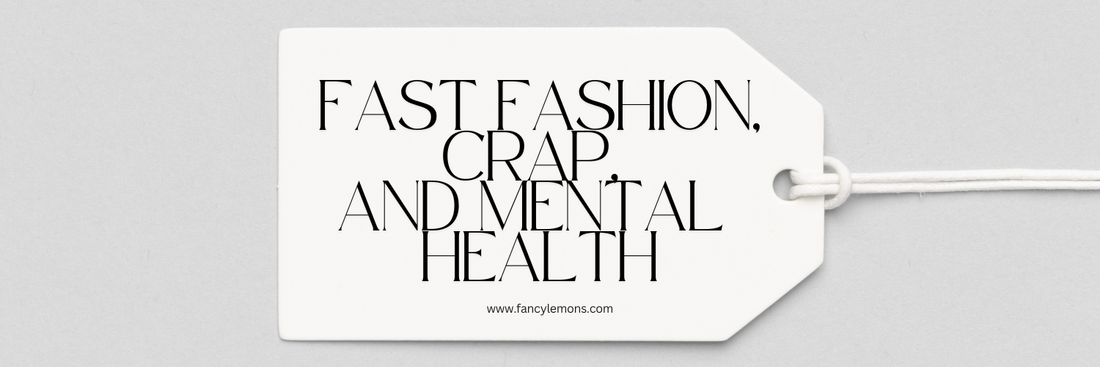
Fast Fashion is Trash (Literally), and I’m Over It
Share
Here’s a fun fact: The average American throws away 81 pounds of clothing per year. Yeah, you read that right. Not donates. Throws. Away. As in, perfectly good clothes are rotting in landfills, taking hundreds of years to break down (if they even do at all).
And for what? So people can buy a $5 trendy top, wear it once, and then toss it because it fell apart after one wash? Excuse me while I scream into the void.
Fast fashion brands are typically those that mass-produce trendy, low-cost clothing at rapid speeds to keep up with the latest styles. They prioritize quantity over quality, using cheap materials and often unethical labor practices. These brands contribute significantly to waste, pollution, and the “wear once, throw away” culture. They flood the market with disposable fashion, convincing people they need more, more, more, without any thought to what happens to those clothes once the trend dies.
I hate fast fashion. I hate its wastefulness. I hate its cheap, flimsy fabrics. And I really hate that it tricks people into thinking they need to constantly consume more and more and more—at the cost of our one and only planet.
Somewhere along the way, I realized that my disgust for fast fashion wasn’t just about the environment—it was about life itself. This whole culture of use once, throw away, replace immediately doesn’t just apply to clothes. It applies to everything. Friendships, relationships, careers, even people’s attention spans. We’re constantly told we need newer, better, faster, more. And I’m just… tired. Like Detective Murtaugh would say, “I’m too old for this shit” watching people throw away perfectly good clothes because they’re sooo over last month’s trend.
I don’t want to live in a way that discards everything the moment it’s slightly imperfect. I want to take care of what I have. I want to appreciate things with history, craftsmanship, and soul. And I want to give secondhand treasures a new life, rather than feeding the machine that convinces people they need another haul of garbage-quality clothes.
Reselling has been more than just a side gig for me—it’s been a lifeline. At a time when my brain was glitching (thanks, depression) and my body was betraying me (shoutout to my useless thyroid), I found something that gave me purpose. Something that let me work at my own pace, in a way that actually aligned with my values.
Saving the planet, making money, and proving that secondhand is just as good (if not better) than fast fashion’s disposable junk? Yeah, that feels pretty damn good.
So, if you ever feel overwhelmed by this consume-and-discard world we live in, let me tell you—you don’t have to play that game. Shopping secondhand, buying quality over quantity, and embracing the beauty of things that last isn’t just good for the environment. It’s good for the soul.
And if I can make some moolah while doing that? Even better.
I’m on a roll here, so bear with me while I go full Murtaugh and rant about the absolute worst offenders in fast fashion. These brands are the criminal masterminds behind cheap, disposable clothes, overflowing landfills, and the slow but steady death of quality craftsmanship. If clothing had a fast-food equivalent, these guys would be slinging dollar-menu polyester that falls apart before you even leave the drive-thru.
Major Fast Fashion Brands to Watch Out For
🛑 Ultra-Fast Fashion Offenders (The Worst of the Worst):
- Shein – The king of disposable fashion, notorious for ripping off independent designers.
- Fashion Nova – Trendy, cheap, and designed to be tossed after a couple of wears.
- PrettyLittleThing – Fast, cheap, and overflowing with micro-trends that won’t last a season.
- Boohoo – Ultra-cheap, ultra-low quality, and ultra-problematic with labor concerns.
- Zara – Slightly more expensive than Shein, but still cranking out trends at lightning speed.
- H&M – Claims to be sustainable, but still one of the biggest fast fashion contributors.
🛑 Other Big Fast Fashion Players:
- Forever 21 – Cheap trends that fall apart before the second wash.
- ASOS – A mix of brands, but their in-house line is still fast fashion.
- Mango – Stylish, but still focused on mass production.
- Missguided – Churns out trend after trend, pushing overconsumption.
- Bershka – Owned by Zara’s parent company, which says a lot.
- Topshop – Now owned by ASOS, but still rooted in fast fashion.
- Uniqlo – Basic fast fashion disguised as “minimalist essentials.”
⚠️ Greenwashing Brands (Pretending to be Sustainable but Still Fast Fashion):
- H&M Conscious Line – A tiny “sustainable” collection doesn’t erase their main fast fashion business.
- Zara Join Life – Another case of “look, we care!” while still mass-producing junk.
- Nike & Adidas – Their shoes and apparel often fall into fast fashion practices despite eco-friendly marketing.
Why These Brands Are a Problem:
🚨 They create insane amounts of textile waste – Unsold and discarded clothes end up in landfills and oceans(hello, microplastics in our brains).
🚨 They encourage overconsumption – New trends every week? That’s not normal or sustainable.
🚨 Their quality is garbage – Poorly made clothes that rip, fade, or fall apart after a few wears.
🚨 They exploit workers – Many of these brands use sweatshops and unethical labor to keep costs low.
🚨 They flood the resale market with junk – Fast fashion doesn’t hold resale value, making it harder for quality secondhand items to shine.
The Alternative?
✔️ Shop secondhand (Poshmark, eBay, Depop, thrift stores!)
✔️ Buy quality over quantity – Invest in brands that actually last.
✔️ Support small, ethical brands – Ones that pay fair wages and don’t mass-produce junk.
Rant over. Now, go browse my online reselling stores and snag yourself a pre-loved gem that won’t self-destruct after one wash. 😉♻️✨
- Dey
